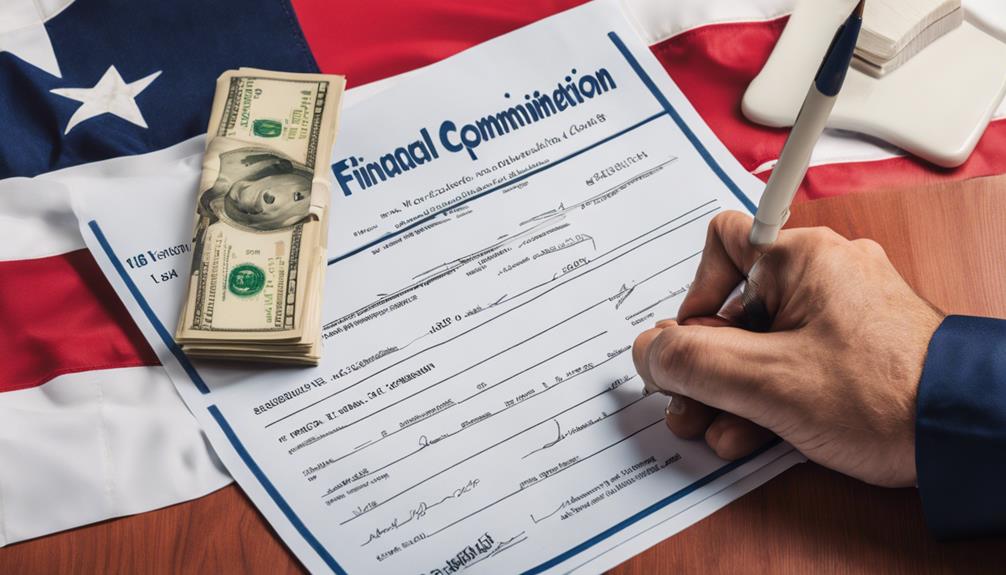When you consider enrolling in a Texas Real Estate School, understanding the $20,000 bond requirement is crucial. This bond isn't just a formality; it serves as a safety net, ensuring that you're protected against potential financial losses stemming from misconduct or non-compliance. You might wonder who exactly needs this bond and what benefits it brings to the table. As you explore these aspects, you'll find that the implications of this bond extend far beyond mere compliance, raising questions about accountability and trust in real estate education. What does this mean for your journey?
Understanding the Bond Requirement

Understanding the bond requirement is crucial for anyone looking to operate a real estate school in Texas. This requirement ensures that you maintain a level of financial responsibility and professionalism in your business practices.
You'll need to secure a $20,000 bond, which acts as a form of insurance for your students and the state. Illinois Surety Bonds outline similar obligations that ensure compliance and protect against financial loss. If any issues arise, such as failure to comply with regulations or misconduct, the bond provides a financial safety net.
Obtaining this bond isn't just a formality; it reflects your commitment to uphold industry standards. You'll work with a surety company, which will assess your financial history and business practices before issuing the bond.
This process helps build trust with your students and the Texas Real Estate Commission.
Who Needs the ,000 Bond
If you're planning to open a real estate school in Texas, you'll need to secure the $20,000 bond. This bond is a crucial requirement for all educational institutions offering real estate courses in the state, as it provides financial protection and ensures accountability within the industry.
It applies to both new and existing schools, ensuring that you comply with state regulations. Moreover, if you're an owner, operator, or an authorized representative of the school, you're responsible for obtaining this bond.
It's not just a bureaucratic hurdle; it demonstrates your commitment to maintaining a standard of education and protecting your students' interests. If you're looking to expand your offerings or even transition from a different type of educational institution into real estate, the bond will still be necessary.
Additionally, consider that the bond serves as a financial guarantee. If students face issues related to your school's operations, they can seek compensation through the bond, which safeguards against potential financial harm from mismanagement or fraud in the educational process understanding used car dealer bonds.
As you prepare to launch or manage your school, understanding who needs this bond is essential for compliance and ensuring a smooth operation. Remember, securing the bond isn't just a formality—it's a key step in establishing your real estate school's credibility in Texas.
Purpose of the Bond

The purpose of the $20,000 bond for real estate schools in Texas is to protect both students and the educational institution itself. This bond serves as a financial safety net, ensuring that if a school fails to meet its obligations or engages in misconduct, students have a way to recover their lost tuition and fees.
In addition, similar to Louisiana Surety Bonds, this bond promotes accountability among real estate schools, encouraging them to maintain high standards of education and business practices.
By requiring this bond, Texas aims to foster a trustworthy educational environment. You, as a student, can feel more secure knowing that there's a financial guarantee in place. This bond also helps to deter dishonest practices, as schools are aware that any violations could lead to significant financial repercussions.
Moreover, the bond benefits the real estate industry as a whole by ensuring that aspiring agents receive quality training. It creates a standard of excellence that ultimately enhances the reputation of real estate professionals in Texas.
In essence, the bond not only protects individual students but also contributes to the integrity and professionalism of the real estate market in the state.
How the Bond Works
When a real estate school in Texas obtains a $20,000 bond, it establishes a financial guarantee that benefits both the institution and its students. This bond acts as a safety net, ensuring that the school adheres to regulations and maintains a certain standard of education. If the school fails to meet its obligations, such as providing quality instruction or fulfilling financial commitments, students have a way to seek compensation.
The bond essentially functions as a promise from the school to operate ethically and responsibly. Should any complaints arise, students can file a claim against the bond. For instance, if you pay for a course that isn't delivered as promised, you can seek reimbursement through the bond. The bonding company will investigate the claim and, if valid, provide the necessary funds up to the bond amount.
This system encourages schools to offer quality programs and helps maintain the integrity of real estate education in Texas. It's a safeguard for you as a student, ensuring that your investment in education is protected.
Applying for the Bond

Applying for the bond involves a straightforward process that requires real estate schools in Texas to meet specific criteria.
First, you'll need to gather all necessary documents, including proof of your school's accreditation and a detailed business plan. This documentation helps demonstrate your school's legitimacy and readiness to operate.
Once you have your paperwork prepared, you'll submit your application to the Texas Real Estate Commission (TREC). TREC reviews the application to ensure compliance with state regulations.
Be prepared for potential follow-up questions or requests for additional information during this review period.
After your application is approved, you'll need to secure the $20,000 bond through a surety company. This step usually involves some background checks and assessments of your school's financial stability.
Once the bond is issued, you must submit it to TREC along with any required fees.
Cost of the Bond
After securing your application approval, understanding the cost of the bond is vital for your school's financial planning. The Texas real estate school bond typically requires a $20,000 coverage amount, but this isn't the only financial consideration you need to account for.
The premium you'll pay for the bond often ranges from 1% to 15% of the total bond amount, depending on your creditworthiness and the bond provider.
For instance, if you're paying a 5% premium, that means you'll fork out $1,000 annually. However, keep in mind that this premium can vary based on various factors, including your financial history and the specific requirements of the bonding company.
It's crucial to shop around and compare quotes from different surety bond providers to find the best deal.
Also, remember that the bond is generally renewed every year, which means you'll need to budget for these recurring costs. Factor these expenses into your overall financial strategy to ensure your school can maintain compliance while remaining financially stable.
Understanding these costs upfront helps you avoid surprises and better manage your school's operational budget.
Benefits of Having the Bond

Having a Texas real estate school bond not only ensures compliance with state regulations but also builds trust with your students and clients. When you have this bond, it shows you're committed to operating your school ethically and responsibly.
This commitment can enhance your school's reputation and attract more students who seek a reliable education.
Additionally, a bond can provide financial security for your students. If any issues arise, such as a failure to deliver services or fraudulent practices, the bond serves as a safety net.
This assurance can make potential students feel more confident in enrolling, knowing they've some protection.
Moreover, having the bond can give you a competitive edge in the market. Many students are looking for schools that demonstrate accountability and professionalism.
Consequences of Not Having the Bond
Operating a real estate school without the necessary bond can lead to significant drawbacks that may jeopardize your business. First and foremost, you risk legal penalties, including fines or even the closure of your school. Without the bond, you'll lack the financial protection required by state regulations, making it difficult to gain or maintain your operating license.
Additionally, not having the bond can damage your reputation in the industry. Potential students may hesitate to enroll, fearing that your school lacks credibility and stability. This decline in enrollment directly impacts your revenue and can hinder your growth prospects.
You may also face increased liability should any disputes arise with students or faculty. Without the bond's protection, you might find yourself personally liable for any financial losses or claims, putting your personal assets at risk.
Moreover, you could miss out on partnerships and networking opportunities within the real estate community, as other professionals may be reluctant to associate with a school that operates outside legal requirements.
In short, neglecting to secure your $20,000 bond can translate to serious financial and operational consequences that could threaten your real estate school's future.
Frequently Asked Questions

If you're considering starting a real estate school in Texas, you likely have questions about the bonding process and its requirements. One common question is, "What's the purpose of the $20,000 bond?" This bond protects students from potential financial loss due to mismanagement or failure of the school.
You might wonder, "How do I obtain this bond?" To get started, you'll need to work with a surety company that issues bonds. They'll assess your financial history and business plans before providing the bond.
Another frequent question is, "What happens if I can't maintain the bond?" If you fail to keep the bond active, you risk losing your school's license and could face penalties.
You may also ask, "Is the bond refundable?" Generally, the bond premium isn't refundable, but you should clarify this with your surety provider.
Additional Resources for Agents
As you navigate the requirements for starting a real estate school, it's important to also consider additional resources available for agents. These resources can significantly enhance your teaching and provide valuable support to your students.
First, consider joining professional organizations such as the National Association of Realtors (NAR) or local real estate boards. These groups offer networking opportunities, educational materials, and updates on industry trends. They can also connect you with experienced mentors who can guide you in your journey.
Next, utilize online platforms like Inman News or Realtor Magazine. These sites provide articles, webinars, and podcasts that cover a wide range of topics, from marketing strategies to legal changes affecting real estate. Staying informed can help you deliver current, relevant information to your students.
Lastly, invest in technology tools that can streamline your operations. Software for managing registrations, scheduling classes, and communicating with students can save you time and improve your service.
Conclusion
In conclusion, securing the $20,000 bond is essential for Texas real estate schools. It not only ensures compliance with state regulations but also protects students from potential financial losses. By obtaining this bond, you're demonstrating your commitment to high ethical standards and accountability in education. Don't overlook this important requirement; it enhances your reputation and fosters trust with both students and the Texas Real Estate Commission, ultimately benefiting your institution in the long run.


